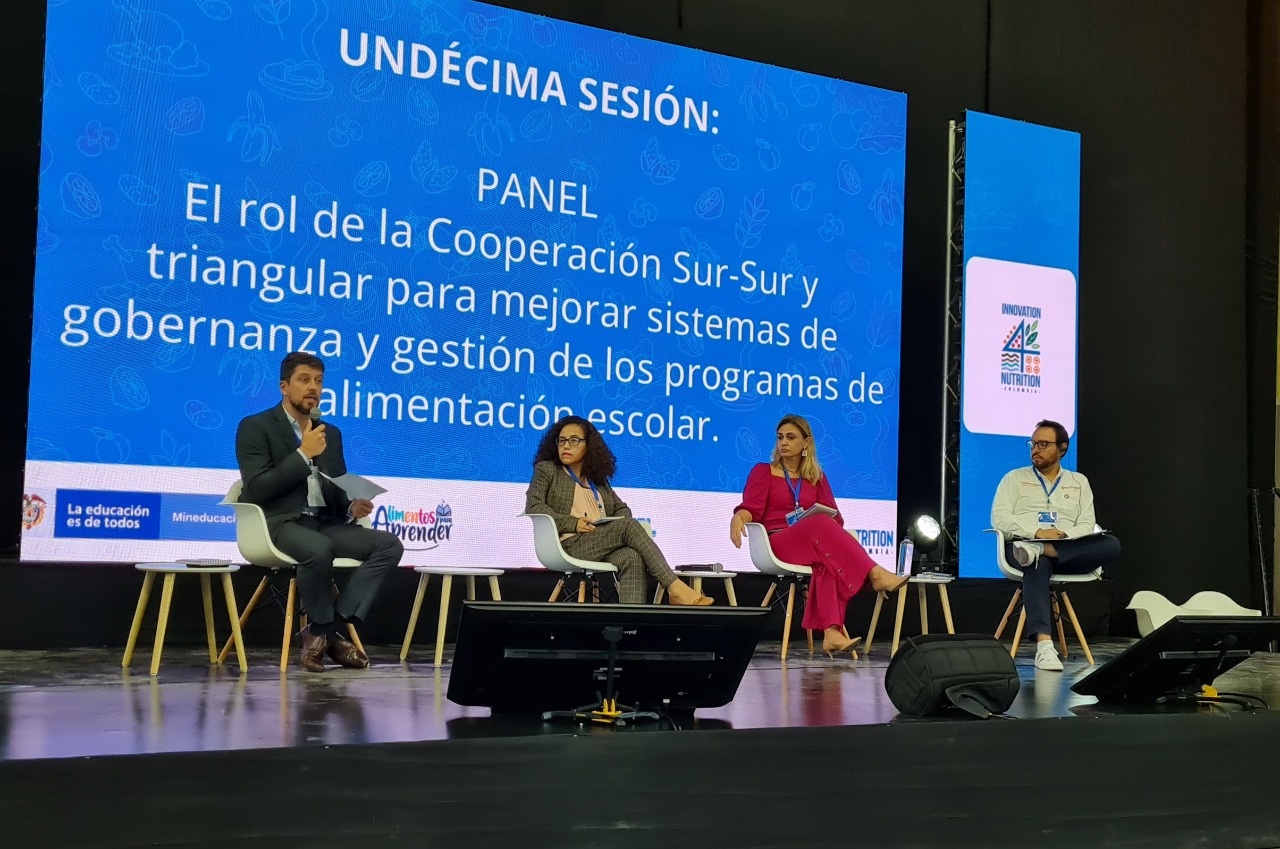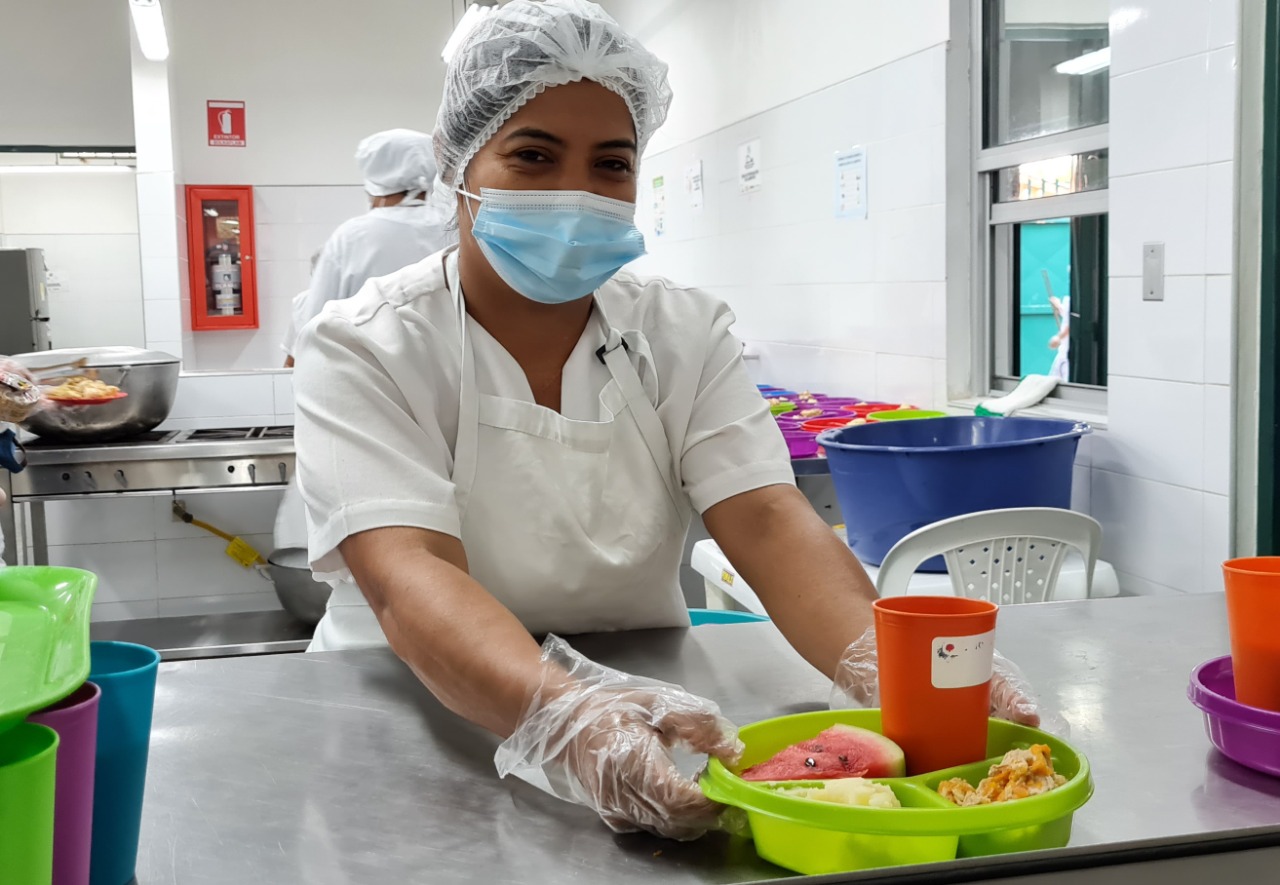
Between April 5 and 7, the city of Barranquilla, in Colombia, hosted the 9th edition of the Regional School Feeding Forum for Latin America and the Caribbean. The event, which had a hybrid format, was organized by the United Nations World Food Programme (WFP) and the Colombian Food to Learn Unit. The event promoted technical
The WFP Centre of Excellence against Hunger Brazil and the Brazilian government participated in several sessions. On Wednesday, April 6, Vinicius Limongi, from the Centre of Excellence Programme team, moderated a session on the role of South-South and Trilateral Cooperation to improve governance systems and the management of school feeding programmes in the region. The session was attended by Karine Santos, Coordinator of the National School Feeding Programme in Brazil; Francisco Durán, from the General Directorate of Food and Community Development in Mexico; and Lena Arias, from WFP in Peru.
The WFP Centre of Excellence against Hunger Brazil and the Brazilian government participated in several sessions. On Wednesday, April 6, Vinicius Limongi, from the Centre of Excellence Programme team, moderated a session on the role of South-South and Trilateral Cooperation to improve governance systems and the management of school feeding programmes in the region. The session was attended by Karine Santos, Coordinator of the National School Feeding Programme in Brazil; Francisco Durán, from the General Directorate of Food and Community Development in Mexico; and Lena Arias, from WFP in Peru.
In an experiences exchange exercise, the panellists shared learning and cooperation tools. “The theme of School Feeding today, in the context of South-South Cooperation, is discussed much more in terms of improving programmes, ensuring sustainable funding, investing in nutrition and socioeconomic impact. In Latin America, the similarities between the countries of the region promote a prioritization of topics such as family farming, local markets and problems such as childhood obesity,” said Vinicius Limongi.
The panel also addressed the importance of not thinking of Cooperation as a replication of models and also looking at learning arising from the challenges faced by other countries. In addition, the benefits of working together with partners such as WFP, which can streamline cooperation processes, was highlighted. “The presence of international organizations in countries and access to information and documentation is a catalyst for long-term cooperation efforts in school feeding,” said Lena Arias.

Challenges and opportunities in school feeding
Throughout the event, experts and representatives from governments and international organizations discussed current challenges and opportunities to strengthen school feeding. Karine Santos, Coordinator of the National School Feeding Programme in Brazil, emphasized the need to think about these programmes strategically. “We need to see these school feeding policies as a state policy, not a policy that undergoes change with each government. May we in fact make our school feeding policies a human right, allowing us to serve all our students,” she said.
Funding for school meals programmes was also discussed. “In Uruguay, school feeding is guaranteed by a tax paid by everyone who owns real estate. The total collected by this tax is around $85 million, which is enough to cover the school feeding programme. Thus, the right of the pupils who receive it is already given and the beneficiaries know it. It is a policy legitimized and appropriated by the population,” explained Violeta Torrens, Director of Basic Education in Uruguay.
The challenges posed by the COVID-19 pandemic, which left millions of children without classes worldwide, were also discussed. For Julieta Cortés, from the Department of Education of the city of Armenia, Colombia, new processes need to be created to minimize setbacks. “In returning to classes after the pandemic, we see a very big educational setback, there are cases where we have to teach children to read again,” she warned. “COVID-19 is a message in itself that no country can work alone. Whether facing the pandemic, investing in our children through school feeding, we have to work together,” said Nesmy Manigat, Haiti’s Minister of Education and Vocational Training.
At the end of the event, participants approved a joint statement that reinforces the importance of strengthening regional learning networks and exchanges between countries in the region.




